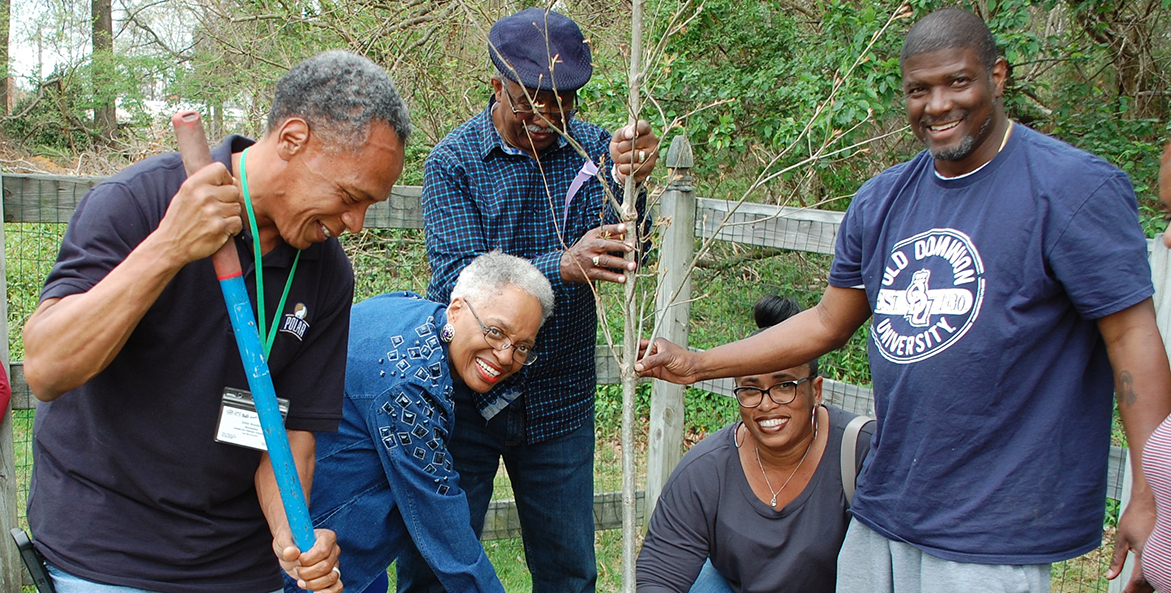A major new initiative in southside Richmond will plant more than 650 new trees in neighborhoods suffering from extreme heat linked to racially-motivated housing discrimination in the past. This will improve quality of life for residents and reduce pollution to the James River. The National Fish and Wildlife Foundation today announced a $227,467 grant to the Chesapeake Bay Foundation (CBF) and local partners for the two-year Greening Southside Richmond Project. This project will plant hundreds of trees, train local youth for green jobs, transform asphalt into green space at Branch’s Baptist Church, and cool some of the hottest neighborhoods in Richmond.
In the first half of the 20th century, Richmond and cities across the U.S. were rife with “redlining,” a discriminatory lending practice that effectively denied mortgages and other investments in predominantly African American neighborhoods. One enduring legacy of this practice is more heat-absorbing concrete and asphalt and fewer trees.
Today, some of these neighborhoods can be up to 16 degrees hotter than tree-covered parts of the same city. The results are dangerous during a heat wave, and rates of heat-related illnesses and deaths are expected to increase due to climate change. The link between extreme heat and redlining is documented in a recent study by the Science Museum of Virginia, Virginia Commonwealth University, and Portland State University.
Trees provide shade and green space that reduce temperatures and electricity bills, decrease stress levels for residents, and improve quality of life. During rains, polluted runoff washes off hard surfaces like buildings and streets directly into streams and rivers. Trees slow and absorb large amounts of runoff, reducing pollution and flooding.
“It’s remarkable how over time trees can transform a blazing hot concrete expanse into a cool, leafy oasis. You can just feel the difference on a summer day within Richmond when you go from parts of Southside to the West End,” said CBF Director of Outreach and Advocacy Ann Jurczyk. “Trees not only reduce air and water pollution, they improve health and save lives by dramatically cooling neighborhoods. Greening Southside is a step towards a greener, more beautiful, and more equitable Richmond.”
CBF used the Richmond Office of Sustainability’s Climate Equity Index map to identify southside census tracts where green space is most needed to reduce heat and improve the health of residents. Residents in these census tracts are 86% African American and Hispanic. As partners in the project, the city’s departments of Public Utilities and Parks, Recreation and Community Facilities will identify city property for planting 250 trees.
Southside ReLeaf, a community organization committed to building a healthy, equitable, and sustainable environment in South Richmond, will work extensively with people living in the area to ensure projects meet community needs. Residents can take part in free workshops on tree care and conservation landscaping, receive one of 400 free trees for planting at home, and apply to have one of five conservation projects installed at home for free.
Local youth will take part in hands-on training for green jobs while planting trees and landscaping as part of Groundwork RVA’s Green Workforce Program. Recent high school graduates will gain marketable job skills by learning techniques for landscaping, tree planting, and maintenance.
At Branch’s Baptist Church, half an acre of unused concrete and asphalt will become a green space of plants and trees. This will beautify the area, reduce the church’s stormwater utility fee, and turn the 10-acre church grounds into a model for conservation.
This project contributes to the City of Richmond’s goal of increasing city-wide tree canopy to 60% and achieving a 30% tree canopy in all neighborhoods, prioritizing areas with a high heat vulnerability index rating and low tree canopy coverage.
The Greening Southside effort builds on CBF work in recent years with Southside Richmond residents to install conservation landscaping and rain gardens, create Eden’s Community Garden and capture polluted runoff at Second Baptist Church, and plant trees and engage the community at Branch’s Baptist Church.
The work in the project is set to begin in late 2020 and be completed by early 2023. The $227,467 federal NFWF grant will be boosted by more than $80,000 in matching funds from local supporters. Partners in Greening Southside Richmond include CBF, the City of Richmond, Groundwork RVA, Southside ReLeaf, Branch’s Baptist Church, True Timber Arborists, Inc., Virginia Department of Forestry, and Virginia Commonwealth University’s College of Humanities and Sciences Department of Biology.




